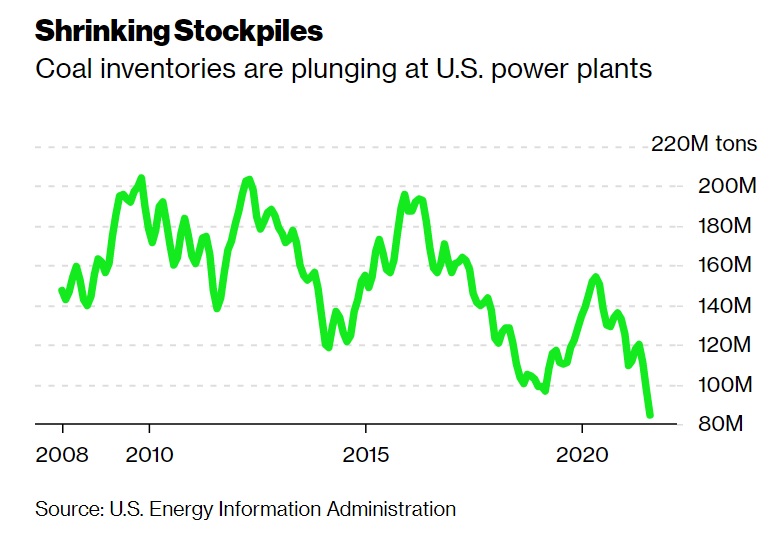Coal supplies reach 24-year lows thanks to years of bad energy policy
Coal supplies at American power plants have reached a 24-year low, according to a report from Bloomberg. Coal is in short supply for many reasons, but much of the blame rests with bad energy policies that have sought to limit coal consumption and hamper coal production at mines. As a result, supply has been unable to catch back up with demand.
Running on empty
Inventories of coal at U.S. power plants have been declining for years as Obam-era regulations and profit-seeking monopoly utilities sought to shut down coal plants as quickly as possible and replace them with wind, solar, and natural gas plants.
U.S. Energy Information Administration (EIA) data show coal supplies have fallen significantly since 2008. But this year’s drawdown in stockpiles shows utilities are burning through reserves at the worst possible time given winter’s imminent arrival, Bloomberg reported.

As we recently discussed, coal supplies are low this year because utilities burned more coal this summer than they thought they would. They burned more coal because it was less costly than burning natural gas, which has more than doubled in price compared to last year. In total, analysts expect coal consumption will be 19 to 21 percent higher in 2021 than in 2020.
The main problem is that coal producers have not been able to increase supply to meet rising demand. Years of federal and state policies enacted to cripple the coal industry have had their intended effect, as they have successfully forced many companies into bankruptcy. Many companies were forced to sell off equipment to remain solvent, reducing their ability to increase production at a later date.
Utilities have been caught flat-footed by both rising natural gas prices and the limited ability of the coal industry to increase production. Bloomberg reports coal stockpile trends didn’t look unusual in the first half of the year, but then fell 13 percent in July from the prior month and another 13 percent in August.
Energy policy matters
Regulations like the Clean Power Plan and state-level renewable energy mandates have had a big impact on the financial viability of coal plants in the United States, which affects investment decisions throughout the entire coal industry.
The Clean Power Plan, advanced by the Obama administration, would have required deep cuts in carbon-dioxide emissions from the entire power sector. This put coal in the crosshairs, and many utilities sought to close down their coal plants to comply with these proposed rules.
State renewable energy mandates and federal subsidies for wind and solar also affect the viability of coal-fired power plants by adding unneeded electricity to the grid, which drives down wholesale electricity prices. As I wrote here, these policies drive reliable power plant capacity, like coal, off the grid.
It doesn’t take a rocket scientist to understand that government policies designed to hamper the coal industry will reduce the willingness of people to invest in the industry. If we banned the sale of dairy products, we’d have fewer dairy cows around. The same principle applies.
Unfortunately, President Biden and Gov. Tim Walz appear intent on doubling down on failed energy policies that mandate unreliable wind and solar installations on the grid instead of appreciating the industries that provide the reliable energy sources that heat our homes and fuel our cars.